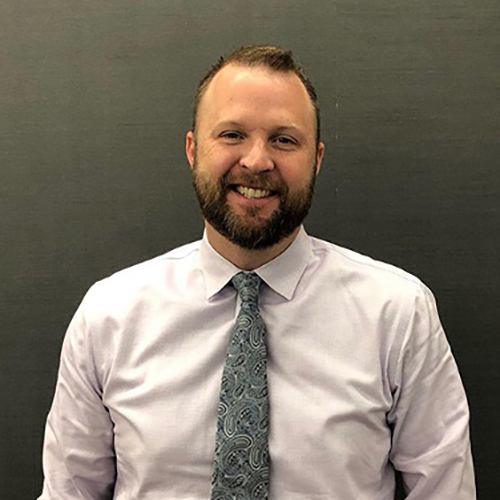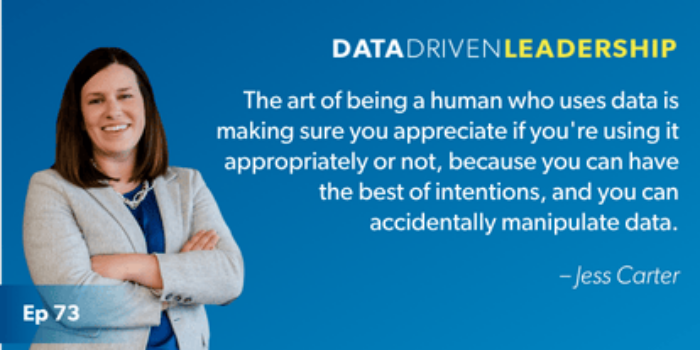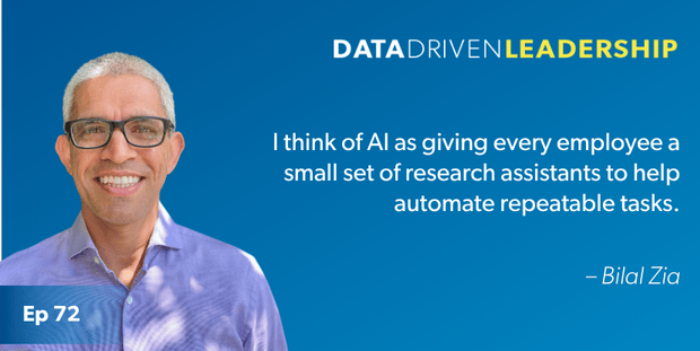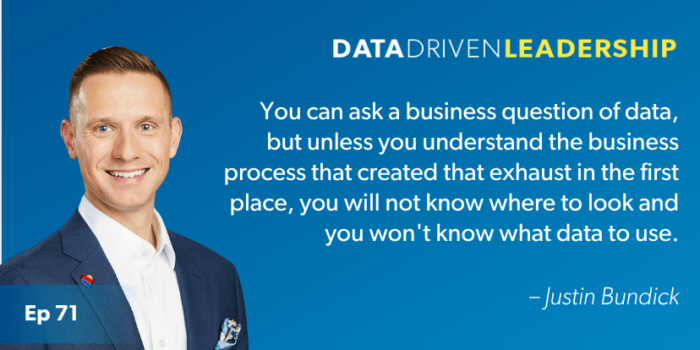

Transcript
Jess Carter: The power of data is undeniable, and unharnessed, it's nothing but chaos.
Speaker 2: The amount of data, it was crazy.
Speaker 3: Can I trust it?
Speaker 4: You will waste money.
Speaker 5: Held together with duct tape.
Speaker 6: Doomed to failure.
Jess Carter: Welcome back to Data Driven Leadership. I'm your host, Jess Carter, and just thrilled to have you for our second season. I'm so excited to be here and kicking off season two with me is a good friend, Todd Hurst. Todd is the Executive Director of the Institute for Workforce Excellence at the Indiana Chamber. Todd, welcome.
Todd Hurst: Thank you. So excited to be here.
Jess Carter: Yeah. So you are the Executive Director of Institute for Workforce Excellence. Can you say a elevator speech or a pitch about what that is exactly?
Todd Hurst: I should be able to, but I never can. But yeah, so essentially the Institute is a 501c3 nonprofit here at the Chamber, and we're really focused on talent retention, talent attraction, talent development across the state of Indiana. And we do that through a few different things. One is really fostering, connecting regional partnerships and the work that's happening across the state in a systemic way through a couple of programs. The Work and Learn Indiana, which is a internship marketplace that we manage, and the Talent Resource Navigator, which is a platform to help us make sense of the talent development, workforce development landscape. And then we have a research wing where we do in-depth studies and data analytics to help inform some of the policy priorities that we have to advance Indiana.
Jess Carter: That is so cool. And then, so a couple of questions. Does every state have a Institute of Workforce Excellence?
Todd Hurst: No. Actually Indiana's pretty unique in, one, that we have an extremely active Chamber of Commerce, and the Indiana State Chamber of Commerce is really one of the most robust active in the country. And there are different states that have different mechanisms that, we work quite a bit with the state of Washington, that they have a nonprofit associated with them as well. Kentucky does as well. So there are some, but it's definitely not the case that every single state has a nonprofit focusing on workforce and education.
Jess Carter: Okay. And then it is a nonprofit, so we're going to dabble a little bit in state policy and how you work with the government too. But you are essentially providing some of these services to citizens to better understand and encourage talent identification, maybe retention, et cetera, in Indiana. So I assume you're looking at the reports about employment and you're looking at what are the hot jobs in the state of Indiana, is that some of what you do?
Todd Hurst: That and also trying to take a forward-looking stance also of not only where we are today and what are the hot jobs and what are some of the challenges we're encountering, but what does the future look like for Indiana and how do we get to a place where we think Indiana is going to be in 5, 10, 15 years down the road, what are the systems and the training programs and the mechanisms that we need to put in place to get to that point to where we want to be as a state?
Jess Carter: Cool. Okay. Well, I'm glad you're here and I'm glad that you do all those things. So today what I thought we could focus on is how you leverage data to enhance state policy and maybe how you connect the dots between our employees, our workforce, and our education, how much we're preparing our workforce, does that sound okay?
Todd Hurst: Yeah, no, that makes sense.
Jess Carter: So I mean, not everybody, I think, imagine even knows what it means when we say how to use data to enhance state policy. So what's your role in state policy?
Todd Hurst: So we have to be very careful there because as a nonprofit, there's a pretty bright line between what we do from a policy perspective. I think as an organization we try to bring to light what the current state is. And so that typically entails doing a lot of work to understand what does the data telling us across the state of Indiana? What are the systems that are in place to create a functioning ecosystem? That's a word you'll probably hear me say a lot in this conversation around workforce development. And then it kind of goes back to that statement I made a second ago, how do we get to the place where we want to be in, that's very much programmatic-driven and thinking through how do the various players come together, what are the programs that are in place? And frankly, what's missing in Indiana to get us to where we need to be?
From that point, we're extremely fortunate to be connected to the Chamber. While there's some division between the nonprofit and the broader chamber, the Chamber does have a lobbying team that we're able to work with pretty closely and make sure that they're aware of what we're doing and they can work with legislators and other policy makers to ensure that some of the stuff that we're seeing within the nonprofit really gets elevated to a different level. But there is definitely a bright line there that we have to be really cautious of. We're more focused on the facts on the ground than any lobbying efforts or trying to change policy.
Jess Carter: Yeah, that makes sense. So give me an example, what's a piece of data recently that you're like, oh gosh, I would hope this would hand state policy?
Todd Hurst: One piece of information that we've been spending a lot of time with right now is work-based learning. We actually did a project last year in partnership with several state agencies that was funded by Lilly Endowment that tried to dig into what is the supply and demand dynamic around work-based learning in Indiana. And essentially that's driven because we know it's a proven strategy to better connect individuals to career pathways, to develop some of that social capital that allows you to know somebody within a field, hopefully get connected to a job and ultimately hopefully retain them here in Indiana. But what we found, in digging into that study, is we don't have the type of data we need to be able to tell that story effectively. We capture some data through our K-12 systems, we capture some data through our post-secondary systems, adult education and registered apprenticeship has some data associated with it.
But one thing to keep in mind there, those are three very different data systems and data sets that are measuring, one, very different things, they're collecting different types of data. I go back to work-based learning from an employer perspective. They're working across the board. It's a systems issue, it's not an individual program issue. And so as we tried to look at this across the board, what we found was data systems were not consistent. And furthermore, when we did collect data, it probably wasn't the kind of data that we really need to collect to be able to effectively change or move the needle in a meaningful way. So we captured a lot of input data on we know X student is going here, we don't know what was the job they did, what was the sector that the employer was in, what was the demand in that sector in that job? What did the student actually learn? What skills and competencies did they leave that experience with?
We don't capture any of that information. And so the output of the study is to say, yeah, we have some information. We're able to tell a little bit of that supply and demand story, but probably not fully. We're actually going back doing a lot more conversations right now to try to gather more of the data that's necessary to tell that story. But at the end of the day, what the real finding is that we probably need to give some real thought to how we approach work-based learning as a system's problem across the entire state? How do we align these efforts across various strategies and silos of efforts? And then furthermore, what are the discrete data points that we need to be pulling so that we can effectively measure and monitor the success for the entire state? Again, our role is to highlight that and then we begin to communicate that among partners to hopefully begin to make some change in Indiana.
Jess Carter: That is so cool. Okay, I'm going to make you back way up because I realize not everybody knows this. Todd, what is work-based learning?
Todd Hurst: So it's a great question, and strangely I say every conversation I have with a school, a college, a intermediary, every time it starts with that question because, one, it's kind of a vague term in and of itself. We used to just use the term internship, but now we use this broader term of work-based learning, but everybody defines it slightly different. So even at the agency levels, we're working through right now what the terminology means across different levels, but when we say work-based learning and we articulate it in the purpose of this study, when we say work-based learning, it means a sustained interaction between a student and an employer that leads to real world hands-on skills and competencies gained that can be applied towards their career pathway.
What that looks like may differ based upon the scenario, the student, the employer, the capacity within a community. So it may be a micro experience that's a few weeks, could be virtual, could be an apprenticeship that is multiple years. All of those count as work-based learning. What we're saying is a job shadow isn't necessarily, there's value in that, that's a career relevant experience that we want to see those happen as well, but in this particular instance, we're talking about more in-depth deep relationships.
Jess Carter: Okay. And I mean, this language, if you get into the workforce re-employment education space, there's these semantics that are very important and in deeply entrenched. And so sometimes I'm like, I got to make sure I even know what you're talking about. It's been a minute since I've been in that space. The other thing I was kind of curious about, if you don't mind me, I don't know how off the conversation I take us here, but one of the things I've been curious about is a lot of the times, in my understanding, which you can correct, the way we measure some of this is defined by some of the ways we fund it, and some of the ways we fund it are pretty lagged against what's actually happening in the economy. So some of the things I get curious about is everybody's got a side hustle. Everybody's an entrepreneur. And so is that, when we talk about work-based learning, that they're starting companies, they're work-based learning. Does that count?
Todd Hurst: Really good question. And something we've wrestled with. I mean, one of the other things that we heard throughout our community stakeholder input sessions for the study was, you want students to do work-based learning, but we also just need people to work within our communities. And so particularly, I mean, I think overall workforce participation rate for 16 to 18 year olds is probably lower than it's been for several years. And so some of our food service or accommodations type services, they're struggling because they can't find that entry-level talent, and we're driving them all towards work-based learning. So there is a little bit of pushback to that. I think where I have really thought about this and wanted to take some of the conversation is that there's a difference between work experience and work-based learning. It doesn't mean one's better than the other, that you may need to do work experience just based upon your situation, especially if work-based learning's not going to be paid.
That's a totally different topic. There are tons of students across the state of Indiana who are working in the evening that may or may not get counted as work-based learning. And especially if that continues to be part of what is a graduation requirement, maybe we should rethink and give some credit to that. But the challenge would be we would also need to tie in what is that student learning? And that's where that work experience, work-based learning continuum gets a little bit messy, is the difference is that a work-based learning, we're able to document the students learning something along a career pathway. It may be soft skills or durable skills, whatever the terminology we use, but we need to figure out how to document that in a meaningful way for the educational system.
Jess Carter: Man, it's a fascinating subject matter, because the other thing I was thinking is your findings on that report were just so insightful where it's like, hey, we wanted to measure these things and we found out that our yard stick wasn't the right thing or the thing we were measuring, we didn't have the right granularity of data or type of data to measure it. I imagine that people in almost any industry can relate to that, where they're like, I just want to know this thing. I want to be data-driven. Can you give me this report? And someone comes back to them and they're like, no, I can't give you the report. Or it's I can give it to you, but you shouldn't trust the data to make a decision.
Todd Hurst: That's right.
Jess Carter: And so uncovering, maybe one of the geeky questions I have for you is that probably was a frustrating experience to be like, I really wanted this clear outcome from a data-driven leadership perspective, how did you navigate a situation where you were like, I really want this clear data, I want to give it to the grantors and show them how amazing it was and like, oh, we've got this finding. And yeah, how did you kind of wrestle through all of that? Because it sounds like quite the experience.
Todd Hurst: It's an ongoing experience. We're still wrestling through some data and actually had conversations with universities as of yesterday, trying to think through some of the data that we can potentially still collect. And I think part of it is recognizing that data tells a powerful story, but there's also qualitative elements to data collection that tell a powerful story as well. The fact that we may not have all of the data to be able to say with absolute certainty that X, Y, and Z is happening, the fact that we don't have that data tells us something about the systems that are in place that allow us to move things forward.
And so it's really spurred a lot of really great conversations with the Department of Education, the Commission of Higher Education, the Governor's Workforce Cabinet, the Department of Workforce Development, to bring everybody together and say, this is a challenge that we've identified. We would love to give you the answer. We can't give you the answer because of this. How do we fix this? And has really spurred, I think, a lot of really good collaboration that, frankly, may not have happened otherwise. So it's being able to find those opportunities in the messiness that, I think, has really proof beneficial to us.
Jess Carter: For the very relatable experience of thinking you could ask a very simple question of your data and get a very simple answer that's reliable, realizing that you can't and then learning from that, taking the time to reflect and be like, okay, we did learn something. What did we learn? That is very light bulb invention type stuff to me of what didn't work and how do we learn from that too, and what did we find and how do we leverage that? And I imagine for a lot of people that might be finding themselves stuck in that spot, that can be inspiring.
Todd Hurst: It's, frankly, led to some really exciting conversations around what can we do as a state to do better moving forward as well. And I even think about that from our own offerings. I mentioned earlier, we manage Work and Learn Indiana, which is a platform that's been in place since the early 2000s that we've been placing students was Indiana Internet. And what we found is there's a lot of places where universities are doing their own things. High schools are doing their own things. Employers told us through the focus groups that work-based learning is a massive thing right now. They're getting approached by seven or eight different high schools, by three or four different post-secondary institutions, by workforce boards, like everybody's coming.
One, there's no common definition, back to that earlier point, so there are different goals and requirements with all these different partners, but secondarily, they just need help making sense of that mess. And maybe that's a place where we are better served. So we've been thinking about at the institute, maybe we need to rethink the way that we have historically worked and continue to evolve to better meet the needs of employers and students across the state rather than continuing to contribute to the messiness that is the landscape.
Jess Carter: I am so encouraged and inspired by some of that because I think that it is neat and encouraging to talk to somebody as skilled and capable and impressive as you are, Todd, and hear you acknowledge there are things to learn, we can listen and adapt to really make a difference, and the path we thought we were on pivoted because it was the most meaningful thing to do. I think that is super cool.
I think as I listen back to Todd explaining his experience, trying to leverage data to make data-driven insights and then realizing that data didn't exist the way he needed it to, to have those insights. What most impressed me was hearing the way he handled that, I'm sure with a whole team of support around him, but the way he handled that to say, okay, but there's still something we just learned then. The infrastructure isn't in place to collect the kind of data we need today. Surely we're going to need more of that kind of data tomorrow. And so how can I start to change or influence or ask the right questions of the system and the players and the entities around me so we can start solving for that problem, is such an incredible leadership skill.
Instead of just walking away disappointed that he couldn't generate the insights he wanted to or, what might be worse, taking huge leaps about the data, analyzing it poorly, and having insights that are not trustworthy, he figured out how to leverage that experience for the betterment of workforce and education moving forward and shared that with those around him. Thank you for listening. I'm your host, Jess Carter, and don't forget to follow the Data Driven Leadership wherever you get your podcasts. And rate and review, letting us know how these data topics are transforming your business. We can't wait for you to join us on our next episode.
Insights delivered to your inbox





